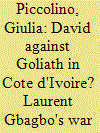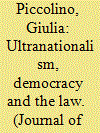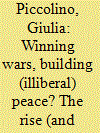|
|
|
Sort Order |
|
|
|
Items / Page
|
|
|
|
|
|
|
| Srl | Item |
| 1 |
ID:
110889


|
|
|
|
|
| Publication |
2012.
|
| Summary/Abstract |
While a doctrine of liberal interventionism seems to be gaining acceptance, it remains constrained by the resilience of state sovereignty and by the resistance of internal elites to externally driven prescriptions. This article looks at Côte d'Ivoire's tortuous peace process and at the recent post-electoral crisis, exploring how former Ivoirian President Laurent Gbagbo developed strategies for neutralizing the threat that international peacemaking and peacekeeping intervention posed to his rule. It is argued that a particular ideological discourse played a crucial role in Gbagbo's struggle against 'global governance'. Such a discourse combined the legalistic exaltation of state sovereignty, a fierce anti-colonial nationalism, and religious overtones in portraying the Ivoirian crisis as a 'war of second independence' against a wide range of international enemies. While nationalist rhetoric had been toned down after the conclusion of the Ouagadougou Political Agreement in 2007, the confrontation between Gbagbo and the international community reignited during the 2010-11 post-electoral crisis. A series of new developments - in particular the UN's certification mandate - rendered Gbagbo's political tactics and the recourse to nationalism ineffective and contributed to his fall.
|
|
|
|
|
|
|
|
|
|
|
|
|
|
|
|
| 2 |
ID:
146125


|
|
|
|
|
| Summary/Abstract |
Fiscal sociology has alleged the existence of a mutually reinforcing effect between the emergence of representative government and effective taxation. This paper looks at Benin, a low-income country that successfully democratised in the early 1990s. It finds that Benin appears to have reinforced its extractive capacities since democratisation. However, the effect of democratisation has been indirect, while the influence of the International Financial Institutions (IFI) and the size of the country's informal sector have played a more direct role. Nevertheless, the hypothesis that effective taxation is based on a quasi-consensual relationship between the state and the taxpayers finds some confirmation.
|
|
|
|
|
|
|
|
|
|
|
|
|
|
|
|
| 3 |
ID:
156768


|
|
|
|
|
| Summary/Abstract |
Fiscal sociology has alleged the existence of a mutually reinforcing effect between the emergence of representative government and effective taxation. This paper looks at Benin, a low-income country that successfully democratised in the early 1990s. It finds that Benin appears to have reinforced its extractive capacities since democratisation. However, the effect of democratisation has been indirect, while the influence of the International Financial Institutions (IFI) and the size of the country's informal sector have played a more direct role. Nevertheless, the hypothesis that effective taxation is based on a quasi-consensual relationship between the state and the taxpayers finds some confirmation.
|
|
|
|
|
|
|
|
|
|
|
|
|
|
|
|
| 4 |
ID:
165116


|
|
|
|
|
| Summary/Abstract |
The literature on peacebuilding has increasingly emphasized the importance of the local level – a trend that has been called the local turn. For some researchers, the local turn can improve international peacebuilding interventions, while for others it is an agenda to promote an emancipatory and legitimate peace. There is however mixed evidence backing the argument that addressing local level issues in peacebuilding can make a substantial difference. The local turn reposes on assumptions that appear particularly problematic in an environment characterized by the lack of an elite-level pact, such as a conflict terminated in a military victory. Looking at the crisis in Côte d'Ivoire, which terminated in 2011 with the defeat of former president Laurent Gbagbo, this article highlights how the lack of elite level reconciliation compromises the effectiveness of actions aiming to promote local ‘social cohesion’. It also shows how the discourse and practices of the local turn can be appropriated by semi-authoritarian post-conflict governments in order to depoliticize the peacebuilding process. It concludes that the popularity of the ‘local turn’ among peacebuilders might be due more to the opportunity that it offers to eschew delicate national-level political issues, than to its supposed emancipatory potential.
|
|
|
|
|
|
|
|
|
|
|
|
|
|
|
|
| 5 |
ID:
174076


|
|
|
|
|
| Summary/Abstract |
Of all African regional organizations, the West African Economic and Monetary Union (WAEMU) is the one that has most explicitly followed the model of the European Union (EU), emulating key EU institutions and practices. WAEMU’s mimicry of the EU is puzzling, considering the economic, political and geographical differences between the European and the West African regional contexts. This article argues that, in order to understand WAEMU’s trajectory, it is necessary to look at two interrelated factors: on the one hand, the WAEMU's history of colonial legacies and post-colonial dependence; on the other, its drive to mimic similar institutions that are seen as embodying the standards of modernity and legitimacy. The WAEMU’s isomorphism has been an outcome of external pressures, but also a response to uncertainty and a result of professionalization. Institutional isomorphism has had a mixed impact on the effectiveness of the organization, helping it to sustain its legitimacy but also stifling endogenous development.
|
|
|
|
|
|
|
|
|
|
|
|
|
|
|
|
| 6 |
ID:
131793


|
|
|
|
|
| Publication |
2014.
|
| Summary/Abstract |
Although much has been written about the ideology of Laurent Gbagbo's Front Populaire Ivoirien in Côte d'Ivoire and its impact on the Ivorian politico-military crisis, little attention has been paid to the ubiquitous role of the law in the discourse and political strategy of the pro-Gbagbo elite. The Ivorian case may provide important insights about the connection between ultranationalist ideology and a legalist, formalist conception of democracy and national sovereignty. The article analyses the circumstances of the emergence of 'legalist nationalism' in Côte d'Ivoire by looking at key episodes of the Ivorian transition between 2002 and 2012. The article discusses the relevance of Pierre Englebert's concept of 'legal command' and the turbulences of democratic transitions in accounting for the prominence of legalism in Ivorian politics. It explores the implications of the Ivorian case for understanding the connection between law and politics in Africa.
|
|
|
|
|
|
|
|
|
|
|
|
|
|
|
|
| 7 |
ID:
141143


|
|
|
|
|
| Summary/Abstract |
The literature on peacebuilding dedicates very little space, empirically and theoretically, to countries that are emerging from a war waged to a decisive outcome. This review essay looks at Sri Lanka and Rwanda, two countries where a victorious leadership has led the process of post-conflict reconstruction, largely by employing illiberal means. It looks at the effect of decisive war on statebuilding and at the role of local agency and illiberal practices in a post-victory context. It concludes by assessing the global significance and long-term sustainability of post-victory illiberal statebuilding.
|
|
|
|
|
|
|
|
|
|
|
|
|
|
|
|
|
|
|
|
|